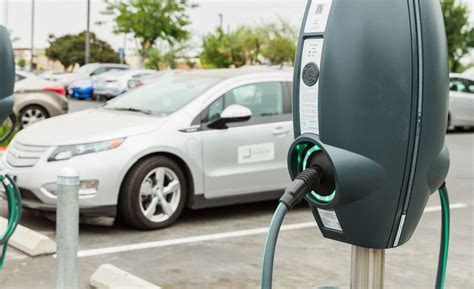Unlock Savings: How Edison’s Electric Car Rebate Can Transform Your Commute
As the world pivots towards sustainability, electric vehicles (EVs) are emerging as a practical solution for both environmentally conscious consumers and those looking to cut costs. Edison’s Electric Car Rebate program is part of this movement, providing incentives that can significantly reduce the financial burden of owning an electric car. This article delves into how this program can transform your daily commute and unlock substantial savings.
The Rise of Electric Vehicles
The automotive industry is undergoing a tremendous transformation. With growing concerns about climate change and air pollution, electric vehicles are rapidly gaining popularity. Innovations in battery technology have improved range and performance, making EVs a viable alternative to traditional internal combustion engine vehicles. In response to this shift, many utility companies, including Edison, are stepping up to offer financial incentives to promote EV adoption.
Edison’s Electric Car Rebate Program
Edison’s Electric Car Rebate program is designed to encourage residents to switch to electric vehicles. The rebates can cover a significant portion of the costs associated with purchasing or leasing an electric car. The structure of the program aims to make electric vehicles accessible to a broader audience, thereby reducing greenhouse gas emissions and promoting a cleaner environment.
How the Rebate Works
Upon purchasing or leasing an eligible electric vehicle, customers can apply for a rebate through Edison. The amount of the rebate varies depending on the model and price of the vehicle, often ranging from hundreds to thousands of dollars. Additionally, there may be further incentives for purchasing EV chargers or installing home charging stations.
Financial Implications and Savings
One of the most compelling reasons to switch to an electric vehicle is financial savings. The costs associated with maintaining an electric car are typically lower compared to conventional vehicles. Here are some of the key financial incentives and savings that come with Edison’s Electric Car Rebate:
Lower Fuel Costs
Edison’s rebate is just the first step towards saving. Electric charging costs are substantially lower than gas prices. With the average electricity rate being lower than gasoline per mile, EV owners can reduce their annual fuel expenses significantly. According to some estimates, EV drivers can save approximately $800 annually on fuel costs alone.
Reduced Maintenance Expenses
Electric vehicles require less maintenance than traditional gasoline-powered cars. They don’t have oil changes, fuel filters, spark plugs, or exhaust systems to worry about. Over time, this translates to lower maintenance costs, which can be a significant advantage for budget-conscious drivers.
Tax Incentives
In addition to Edison’s rebate, there are federal and state tax credits available for electric vehicle purchasers. The federal tax credit can be as high as $7,500, further lowering the effective cost of purchasing an EV. By combining these savings with Edison’s rebate, the financial burden of transitioning to an electric vehicle becomes significantly lighter.
Environmental Benefits
Switching to an electric vehicle is not just an economically sound choice; it has profound environmental implications. Electric vehicles produce zero tailpipe emissions, drastically reducing the air pollutants that contribute to smog, health problems, and climate change. By participating in Edison’s Electric Car Rebate program, consumers can contribute to a cleaner, more sustainable environment.
Transforming the Commute
With more drivers switching to electric vehicles, the infrastructure is evolving as well. Charging stations are becoming more prevalent, making it easier than ever to own an EV. This change enhances the commuting experience, as the anxiety of running out of battery diminishes with convenient charging options.
Smart Commute Solutions
Edison also encourages smart commuting practices, such as carpooling and using public transport for the remaining mileage after charging at work. Participating in these options can further reduce commute costs and improve time efficiency.
Conclusion
The future of transportation is electric, and Edison’s Electric Car Rebate program is a stepping stone for those looking to embrace this change. Not only does the rebate make electric vehicle ownership more accessible, but it also ushers in an array of financial and environmental benefits. As the infrastructure for EVs continues to expand, commuting in an electric vehicle will become an increasingly feasible and attractive option for everyone. Take advantage of this opportunity to not only save money but also contribute to a greener planet.
FAQs
1. What types of electric vehicles are eligible for Edison’s rebate?
Most new fully electric vehicles and plug-in hybrid electric vehicles qualify for the rebate program. A list of eligible models is typically available on Edison’s website or through customer service channels.
2. How do I apply for the rebate?
To apply for Edison’s Electric Car Rebate, you can visit their official website, fill out the required application forms, and provide proof of purchase or lease.
3. Can I combine Edison’s rebate with other incentives?
Yes, you can often combine Edison’s rebate with federal and state tax incentives. It’s advisable to consult with a tax professional to understand how these incentives interact.
4. Is there a limit on the number of rebates I can apply for?
Typically, rebates are awarded for one vehicle per household, but this may vary based on specific program features. Check Edison’s guidelines for confirmation.
5. What happens if I move after receiving the rebate?
Residents should confirm with Edison as policies may vary, but generally, moving does not affect the rebate if eligibility conditions are still met at the new address.
Download Edison Rebate Electric Car
